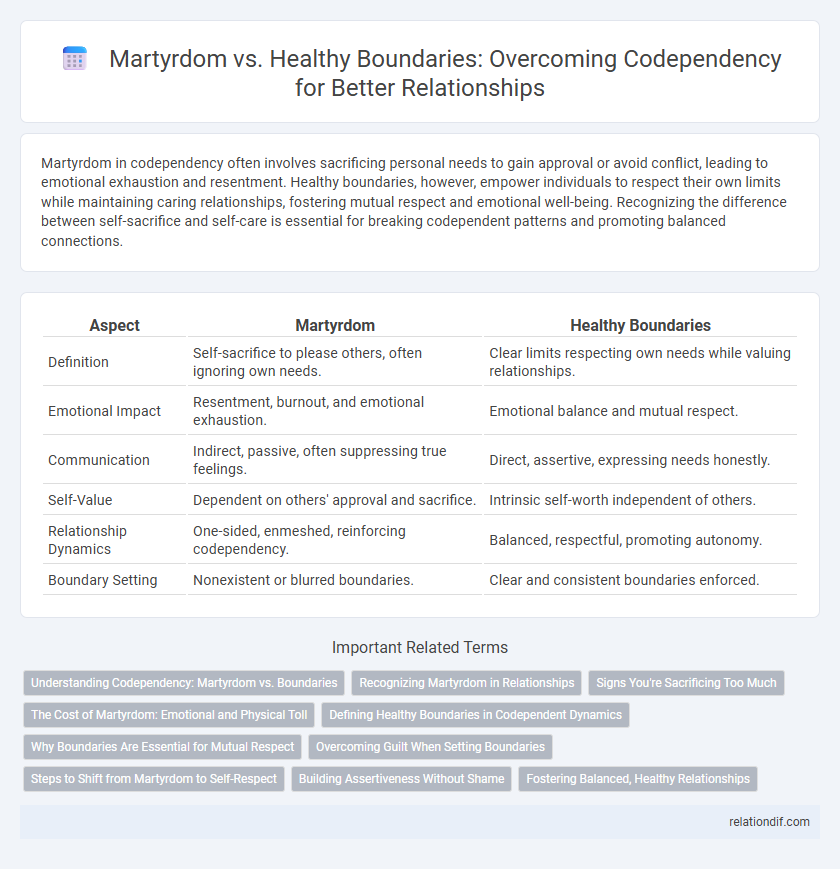Martyrdom in codependency often involves sacrificing personal needs to gain approval or avoid conflict, leading to emotional exhaustion and resentment. Healthy boundaries, however, empower individuals to respect their own limits while maintaining caring relationships, fostering mutual respect and emotional well-being. Recognizing the difference between self-sacrifice and self-care is essential for breaking codependent patterns and promoting balanced connections.
Table of Comparison
| Aspect | Martyrdom | Healthy Boundaries |
|---|---|---|
| Definition | Self-sacrifice to please others, often ignoring own needs. | Clear limits respecting own needs while valuing relationships. |
| Emotional Impact | Resentment, burnout, and emotional exhaustion. | Emotional balance and mutual respect. |
| Communication | Indirect, passive, often suppressing true feelings. | Direct, assertive, expressing needs honestly. |
| Self-Value | Dependent on others' approval and sacrifice. | Intrinsic self-worth independent of others. |
| Relationship Dynamics | One-sided, enmeshed, reinforcing codependency. | Balanced, respectful, promoting autonomy. |
| Boundary Setting | Nonexistent or blurred boundaries. | Clear and consistent boundaries enforced. |
Understanding Codependency: Martyrdom vs. Boundaries
Codependency often manifests through martyrdom, where individuals sacrifice their own needs to gain approval or avoid conflict, leading to unhealthy emotional patterns. Establishing healthy boundaries involves recognizing personal limits and communicating them assertively, fostering self-respect and balanced relationships. Understanding the distinction between martyrdom and boundaries is crucial for breaking codependent cycles and promoting emotional independence.
Recognizing Martyrdom in Relationships
Recognizing martyrdom in relationships involves identifying patterns where one partner consistently sacrifices personal needs to appease the other, leading to resentment and emotional depletion. Martyrdom manifests through behaviors such as overcommitting, suppressing feelings, and seeking validation by self-sacrifice, which undermines healthy boundaries essential for mutual respect and balanced emotional exchange. Differentiating between genuine care and martyrdom helps foster relationships grounded in reciprocal support and individual well-being.
Signs You're Sacrificing Too Much
Signs you're sacrificing too much in codependency include neglecting personal needs, feeling resentful after helping others, and struggling to say no. Constantly putting others' happiness above your own can lead to emotional exhaustion and loss of identity. Recognizing these patterns is crucial to establishing healthy boundaries and preventing martyrdom.
The Cost of Martyrdom: Emotional and Physical Toll
Martyrdom in codependency often leads to chronic emotional exhaustion, heightened stress levels, and increased risk of depression and anxiety disorders. Physically, the constant neglect of self-care can manifest as fatigue, weakened immune response, and psychosomatic illnesses. Establishing healthy boundaries mitigates these risks by promoting self-respect and emotional resilience, ultimately improving mental and physical well-being.
Defining Healthy Boundaries in Codependent Dynamics
Healthy boundaries in codependent dynamics involve recognizing and respecting personal limits while promoting mutual respect and autonomy. Setting clear emotional, physical, and mental limits helps prevent the sacrifice of one's needs for others' approval or control. This balance fosters self-respect, reduces resentment, and encourages interdependent rather than martyr-like relationships.
Why Boundaries Are Essential for Mutual Respect
Setting healthy boundaries is essential for mutual respect because it clearly defines personal limits and prevents the resentment that often accompanies martyrdom in codependent relationships. Boundaries promote individual autonomy while fostering honest communication and emotional safety between partners. Respecting these limits encourages balanced give-and-take, which strengthens trust and sustains long-term relational well-being.
Overcoming Guilt When Setting Boundaries
Overcoming guilt when setting boundaries requires recognizing the difference between martyrdom and healthy boundaries, where martyrdom involves self-sacrifice and codependent behaviors that lead to resentment. Establishing healthy boundaries promotes self-respect and emotional well-being, minimizing codependent tendencies by prioritizing personal needs without fear of rejection. Embracing this shift reduces guilt, empowering individuals to maintain balanced relationships and foster genuine connections.
Steps to Shift from Martyrdom to Self-Respect
Recognizing patterns of martyrdom involves identifying self-sacrifices that lead to resentment and emotional exhaustion. Setting healthy boundaries requires clear communication of personal limits and practicing assertiveness to honor one's needs without guilt. Consistent self-reflection and seeking support from therapy or support groups facilitate a transition toward self-respect and balanced relationships.
Building Assertiveness Without Shame
Building assertiveness without shame involves recognizing personal needs while respecting others' boundaries, a crucial step in overcoming codependency and avoiding martyrdom. Developing clear communication skills fosters self-respect and minimizes resentment often associated with self-sacrifice. Establishing healthy boundaries promotes emotional well-being and balanced relationships, enabling individuals to support others without losing their sense of self.
Fostering Balanced, Healthy Relationships
Martyrdom in codependency often leads to self-sacrifice that undermines personal well-being and fosters resentment, while healthy boundaries promote mutual respect and emotional balance. Establishing clear limits allows individuals to support others without losing their own identity or needs, creating sustainable and equitable relationships. Fostering balanced connections requires recognizing the difference between self-neglect and compassionate engagement, ensuring both parties maintain autonomy and trust.
Martyrdom vs Healthy Boundaries Infographic

 relationdif.com
relationdif.com